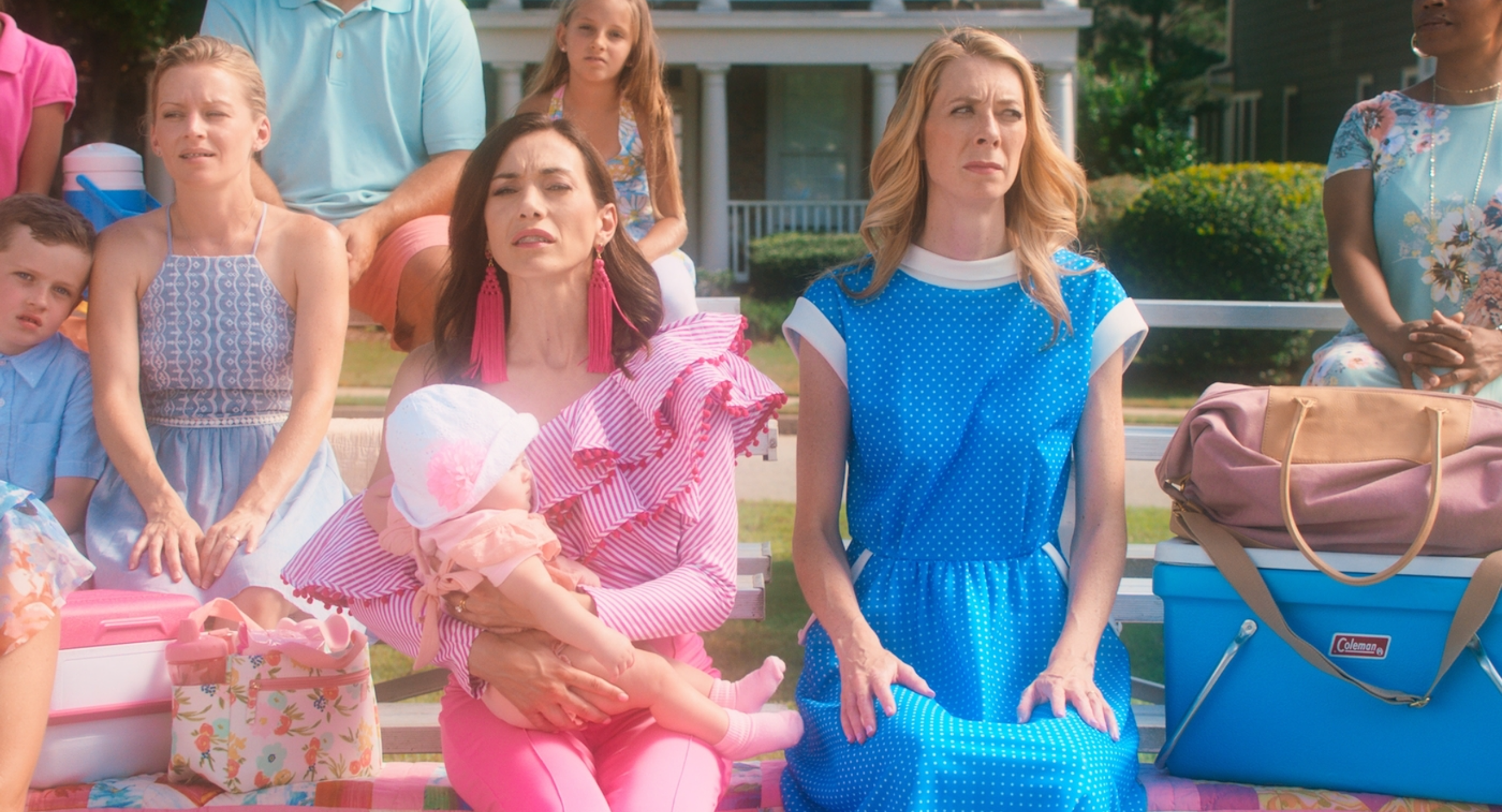Greener Grass – Film Review
Published March 13, 2024

The film landscape of 2019 brought us many cinematic ventures that ranged from breathtakingly dramatic to outlandishly bizarre, yet among these, Greener Grass stands uniquely on its own, eccentric turf. Written, directed, and starring the dynamic duo of Jocelyn DeBoer and Dawn Luebbe, the film transforms suburban satire into an almost hallucinogenic trip, filled with grotesque comedy and an oddly compelling aesthetic. While it might not be everyone’s cup of tea—drenched as it is in flamboyant pastels and surreal absurdity—it certainly carves out a niche for itself. Greener Grass is a whimsically weird journey through the looking glass of American suburbia.
The premise of Greener Grass is anything but straightforward. Set in a hyper-stylized suburban landscape, where adults wear braces and golf carts are the preferred mode of transportation, the film explores the lives of its central characters, Jill (DeBoer) and Lisa (Luebbe), two soccer moms ensnared in a bizarrely competitive friendship. The opening scene—where Jill casually hands over her baby to Lisa after receiving a compliment—sets the tone for the surreal, yet darkly comic narrative that follows. This initial exchange of a child as though it were a mere accessory encapsulates the film’s underlying critique of suburban vanity and the obsession with external appearances.
At its core, Greener Grass is a kaleidoscopic satire of suburban ennui and the peculiar desperation that seems to lurk beneath the veneer of manicured lawns and perfect smiles. The filmmakers ingeniously employ a barrage of absurdist humor, with characters spontaneously transforming into dogs, and soccer balls being treated as newborns, to skewer the homogenized sameness and underlying competitiveness of suburban culture. The use of bright, almost nauseating colors throughout the film not only amplifies its dream-like quality but also serves as a clever metaphor for the artificiality that characterizes these seemingly idyllic communities.
One of the film’s greatest strengths lies in its unyielding commitment to its unique aesthetic and tone. DeBoer and Luebbe deliver outstanding performances that perfectly encapsulate the exaggerated politeness and passive-aggressiveness of their characters, while the supporting cast, including Beck Bennett and Neil Casey, contributes to the overarching strangeness with their commendable performances. Moreover, the meticulous production design and wardrobe choices deserve special mention for their role in bringing this bizarre world to life.
However, despite its myriad strengths, Greener Grass is not without its flaws. The relentless onslaught of absurdity and non-sequiturs, though amusing, can occasionally feel overwhelming, leaving viewers scrambling for narrative coherence. The film’s pacing is erratic, with some scenes lingering a tad too long, thereby diluting the comedic impact. Additionally, while the satirical underpinnings of the film are clear, the execution sometimes veers into the realm of the incomprehensible, which may alienate viewers not fully attuned to its idiosyncratic sensibilities.
Another aspect of Greener Grass that merits discussion is its commentary on gender roles and the sexualization of women within the suburban context. The film offers a scathing, albeit bizarre, critique of the pressures placed on women to conform to societal norms of beauty and perfection. However, this theme, while prevalent, is not always explored with the depth and clarity it warrants. Instead, it occasionally gets lost in the film’s broader tapestry of absurdity.
Nevertheless, it’s the film’s unwavering originality and boldness that ultimately redeems its shortcomings. In an era where many movies feel like carbon copies of one another, Greener Grass dares to be different, for better or worse. It’s a film that refuses to be pigeonholed, constantly defying expectations and challenging viewers to see the world through a warped, yet revealing lens.
Greener Grass is a polarizing cinematic endeavor that won’t resonate with everyone, but that’s precisely where its charm lies. It’s an unapologetically bizarre journey through suburban America that manages to be both a visual spectacle and a thought-provoking critique of the absurdity that underpins much of contemporary culture. With its unique vision, DeBoer and Luebbe have crafted a film that’s sure to become a cult classic, appealing to those with an appetite for the unconventional.
